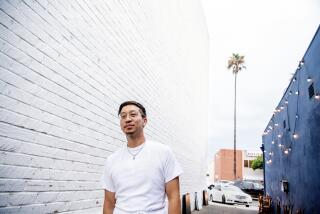Despite Years of Communist Rule, Old Asia Lives On in Laos’ Royal City
- Share via
LUANG PRABANG, Laos — The king was taken away 11 years ago by Communist rulers, but Luang Prabang retains much of its royal charm, nestled among misty mountains and surging rivers--a still-peaceful repository of Buddhism and the finest in Laotian culture.
Despite peeling plaster and ramshackle eaves, the old royal capital--bypassed by war, mass tourism and commercial development--is one of the last places to find old Indochina, indeed old Asia.
Thirteen years after revolutionaries marched into “Never-Never Land,” victorious in the Indochina War, Luang Prabang and many of its 23,000 people cling fervently to the Lord Buddha.
At dawn, lines of saffron-robed monks pad through the streets, emerging from the town’s 57 peaked-roof temples to accept rice and curries from the faithful in a centuries-old ritual.
300 Monks Remain
The area’s Communist Party chief, Vongphet Salykeyachongtoua, said that 300 monks and novices are still here, fewer than before the Communist victory but a considerable number even by standards of countries where Buddhism is actively encouraged.
“We consider religion as the traditional habit of the people,” Vongphet told visiting Western journalists. “Buddhism teaches that people should be good to each other--same as the party.”
But he added that laymen now must seek official permission to join the monkhood, and once enrobed they should help society and the revolution.
Luang Prabang’s exquisite shrines, in which Communist authorities take considerable pride, seem to be maintained, although some are in need of extensive repairs. Monsoon rains spill into the interior of the Wat Mai monastery through holes in the roof. Murals have been bleached. The gilding has faded on some of the exquisite exterior reliefs.
Palace a Museunm
Next door is the former royal palace, now a museum to which the general public is allowed only periodic access.
This modest, one-story building served as the residence of the missing King Savang Vatthana, last of a royal line that goes back to the 14th Century, when Prince Fa Ngoum carved out an extensive and powerful Laotian kingdom.
King Savang, a devout Buddhist, led a secluded life, keeping mostly to his palace, where courtiers and officials approached him on bended knees. Today his outer rooms and throne hall are mounted with displays of royal regalia, precious Buddha images by the hundreds and gifts from world leaders.
On display still is a sliver of moon rock from a 1972 U.S. Apollo space mission and a pen set from President John F. Kennedy. Leonid I. Brezhnev, the late Soviet leader, had sent a shotgun. Chairman Mao Tse-tung of China sent teacups. On the palace grounds, water buffaloes graze contentedly on the grass.
Deposed in 1977
The king and members of his family were taken from Luang Prabang in 1977, and a number of refugee reports say that he died in a Communist re-education camp. Communist officials refuse to say whether he is dead or alive and steer conversations about the royal past to economic developments and the future.
Luang Prabang is officially the country’s poorest province. Its subsistence farmers have been hit by periodic droughts, and its once-rich forests ravaged by migratory hill tribes through slash-and-burn agriculture. High up the Mekong River, a rough, two-day’s road journey from the capital of Vientiane, the town remains isolated.
But Communist chief Vongphet said that Laos’ new economic reforms have given incentive to local farmers to produce more, while foreign donors have provided emergency food aid and long-term assistance. The United Nations has a reforestation project under way. U.S. Mennonites are trying to develop small-scale hydroelectric dams. Cuban volunteers work in the local hospital.
Meagerly stocked not long ago, the town’s main markets now are bustling. Most consumer goods come from neighboring Thailand, and a recent warming of relations with China has sparked cross-border barter trade. Laos offers various jungle products for batteries, toothpaste and medicines.
Jeans and Beer
Enterprising vendors like Thongchin Chitdalin turn cheap Soviet material into jeans, sewing on a fake label of the American jeans-maker Levi Strauss to attract buyers. Others fashion empty Heineken beer cans into wick lamps.
The market women are jovial, cracking jokes and exchanging gossip.
Along the Mekong, knots of townsfolk passed a recent languid afternoon as temple bells sounded in the distance. Schoolgirls in blue sarongs and white blouses pedal their bikes along shady, motor-free streets, smiling at strangers.
Bo Pen Yang is an old Laotian saying still heard in Luang Prabang: “Don’t Worry, Take It Easy, Let Things Flow.”
More to Read
Sign up for Essential California
The most important California stories and recommendations in your inbox every morning.
You may occasionally receive promotional content from the Los Angeles Times.










